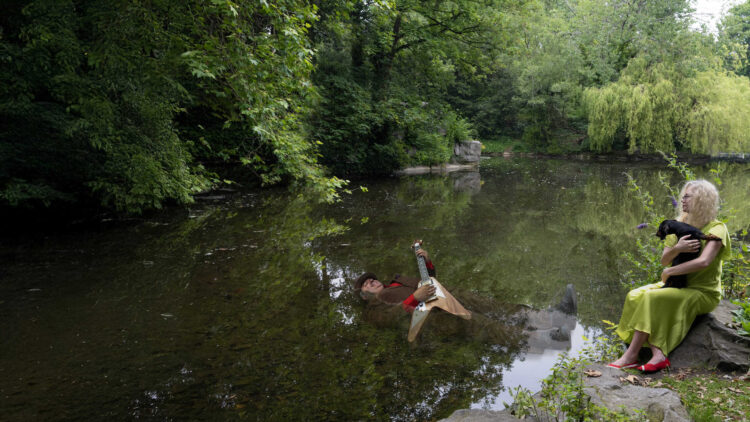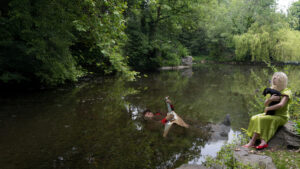Julyo’s latest album, The Willow Doesn’t Weep, is more than a contemporary blues record—it is a living testament to collaboration, emotion, and global artistry. Currently being considered at the 68th Annual Grammy Awards in the category of Best Contemporary Blues Album, the project gathers a remarkable roster of vocalists and musicians from across the world, weaving their unique textures into a cohesive and deeply moving collection of 13 tracks.
From the opening title track, The Willow Doesn’t Weep (feat. Vanessa Jackson), the listener is immersed in an atmosphere where strength and vulnerability coexist. Vanessa Jackson’s commanding voice soars with both grit and grace, grounding the song’s bluesy edge with heartfelt emotion. The production highlights Julyo’s contemporary blues guitar work, while allowing Jackson’s delivery to shine.
The collaborative spirit is a hallmark of this record. On Flee, Mishell Ivon’s performance is beautifully complemented by the haunting interplay of Olga Milgrandt’s cello and Anna Mozolevych’s violin. Together, they transform the track into a poignant blues narrative of escape and longing, supported by Dario Rodighiero’s sensitive lap steel guitar. Rodighiero’s presence throughout the album cannot be overstated—his mastery of piano, Hammond, Rhodes, and Wurlitzer provides harmonic depth, and his arrangements carry the project with fluid sophistication.
Lyia Meta takes the spotlight on Rainy Day, accompanied by the stirring harmonies of gospel choir The Epoch House Choir. Meta’s deep vocal tone enriches the song with resilience and gravitas, proving why she remains one of today’s most distinguished rock and contemporary blues voices in Asia. The result is an anthemic, almost spiritual experience.
Cheri Moon brings her fiery energy to Muddled Rivers, joined by Mack Beatz on percussion and production. Their chemistry creates a bold and infectious groove, blurring the lines between contemporary blues and R&B. Anna Paloma, meanwhile, delivers one of the album’s most delicate and intimate performances on Things Said and Unsaid, imbuing the track with a hushed honesty that lingers long after it ends.
Instrumentals also play a crucial role. Twilight Blues (co-produced with Matthew Shell) and Fall’in Leaves (feat. Suzanne Grzanna) showcase Julyo’s lyrical guitar playing alongside carefully chosen textures like Reinaldo Ocando’s marimba and Mason Mazziotti’s engineering touch. These tracks remind us that the blues can be just as eloquent without words.
The dynamic Bayou Groove pulls listeners toward the American South, featuring America’s Got Talent finalist Steve Ray Ladson on banjo, Rodighiero’s Hammond organ swells, and Arezki “Aki” Bouzid’s saxophones. It is a joyful, genre-bending celebration that bridges Delta blues roots with contemporary sensibilities.
Equally memorable are the vocal performances spread across the album: Carolina Padron brings warmth to Frustrated; Christina Rotondo injects vitality into Oh! Today is the Day, further lifted by Hector Ruano’s harmonica and Peter Catucci’s bass; Keri Mansurova lends intensity to Sad Noise; Samantha Bower gives mystique to The Spell of Ages; and Rachel Philipp closes the album with grace on Willow Tree, a reflective finale.
Behind the scenes, Francesca Pratt’s drumming drives the rhythmic backbone across the record, while Nelly Efron’s bass and Mariano Beyoglonian’s mixing and mastering at Estudio Tritono in Argentina provide the sonic polish. Additional engineering by Andrea Fresu at Keep Hold Studios in Italy, Lughaidh Kelly at Windmill Studios in Dublin, and Raymond Holzknecht in Florida ensures that every track resonates with clarity and depth.
With lyrics penned by E.T. Murphy and photography by Fabio Grassi, The Willow Doesn’t Weep is not only musically rich but also thematically cohesive. It stands as a powerful statement of resilience, nature, and emotion—qualities that align perfectly with the contemporary blues ethos.
As it vies for recognition at the 68th Annual Grammy Awards in the Best Contemporary Blues Album category, this album represents Julyo at his most expansive and inclusive, elevating the blues language into new terrain while honoring the genre’s roots. Each contributor adds a vital brushstroke to the larger canvas, making The Willow Doesn’t Weep a truly collaborative masterpiece worthy of its Grammy consideration.






